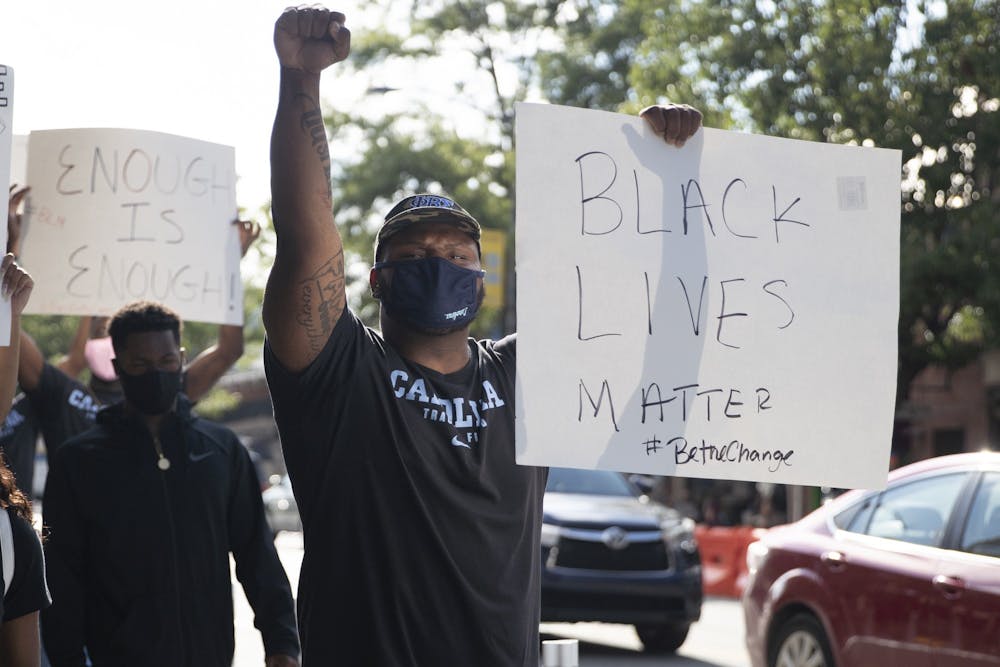“Platforms like UNCUT make breaking the barrier a little bit easier,” Lawler said. “I think it's always a scary thing when you're speaking on something that’s deemed to be controversial, although it shouldn’t be, because, God forbid, Black people have the right to live.”
But half a century after the events at Wyoming, when UNC track and field stars Lauryn Hall and Nicole Barnes — two of the main organizers of the protest — stepped onto Franklin Street as it was set to begin, they felt no fear.
And this time, the athletes had support.
“The night before, our coaches had a team meeting and basically just said, ‘We’re behind you, we’re encouraging you guys,’” Hall said. “‘This is great, we’re glad you’re doing this.’ It was a lot of support, so I wasn’t really nervous about anything.”
Black male athletes are often seen as the public figures of anti-racism protests, such as John Carlos and Tommie Smith at the 1968 Summer Olympics and LeBron James in the NBA. To Barnes and Hall, changing that narrative to include Black women is special.
“You have white men, then you have white women, then you have Black men and then Black women,” Barnes said. “I feel like Black women are so overlooked at times, so I think there was an overall pride in us: me, Rachel (Jones) and Lauren. We looked at each other and were like, ‘We did this. In 24 hours, we put together a protest.'”
‘An important cause for them’
While athletes don't share universal support for their actions — if the booing during the NFL season opening game between the Kansas City Chiefs and Houston Texans, as athletes stood with their arms locked, is any indication — UNC senior and Carolina Association of Black Journalists co-president Landon Bost said athletes continuing to share their messages is more important than ever.
“Those players are preaching ‘Black Lives Matter’ because it’s an important cause for them,” Bost said. “If fans only want to see them as a spectacle, most of what I’ve heard from players is they don’t want those fans supporting them anyways. It’s highlighting who’s with them and who’s not really with them, in the causes that matter to them on and off the field.”
Despite the size of their platform, Victoria Jackson, assistant professor of history at Arizona State and a former UNC track and field star, said she would never criticize a Black athlete for not using their platform. To her, the vulnerability of their weakened positions in the power dynamics of their teams make their roles as activists much harder.
“Too many of the policies in athletics are in direct conflict with supporting Black athletes,” Jackson said. “For example, at UNC — and basically every Power Five school — is really working hard to water down name, image and likeness rights to a point where it’s nothing. That I see as not supporting Black lives because it’s an economic empowerment issue, which makes it a racial justice issue.”
UNC athletic director Bubba Cunningham has stated previously that college athletes should be entitled to benefit from their names, images and likenesses. However, he also expressed concerns regarding just how a program like that would be implemented.
To get the day's news and headlines in your inbox each morning, sign up for our email newsletters.
“We also must ensure that NIL legislation does not negatively impact student-athletes' opportunities to participate,” Cunningham said in a June press release. “I do not want any university to have to cut scholarships or sports programs as an unintended consequence of NIL activities.
"
Jackson said a great way for schools to help athletes to grow as activists is to encourage taking courses that discuss those topics of sports and race in depth.
“My hope is those athletes are being encouraged to take those types of courses,” Jackson said. “When you see the relationship between this institution and African Americans in the state of North Carolina and more broadly, that's when you start to see college sports as another institution contributing to the undervaluing of Black lives.”
‘An extraordinary moment’
Despite college athletics' long history of racism, many are still impressed at the overtures being made by today’s coaches and athletic officials. Quierra Luck, the UNC beat reporter for Sports Illustrated, said she was especially impressed at UNC football's head coach Mack Brown’s public support of the Black Lives Matter movement.
“To me, he’s been the only ACC coach who’s been consistently open and willing to learn about racism,” Luck said. “He wants to learn about how it’s affecting his Black players, and wants to use his platform for his Black players. It’s been wonderful to see.”
In 1969, white coaches banned players for speaking out. Now at UNC, white coaches supported the march in August. The diversity in race and ethnicity of the movement is part of what made this moment in history unique.
When Matthew Andrews, an associate professor of history at UNC, saw the Aug. 29 protest happening on Twitter, he was ecstatic. He was so ecstatic, in fact, he scrapped the lecture he had scheduled for one of his classes. Instead, he chose to talk about the protest and place it in its proper historical context, especially focusing on how “unordinary” of a moment it was.
“For the entire history of college sports, you just never saw anything like this,” Andrews said. “There were some moments in 1968, particularly revolving around what’s known as ‘the revolt of the Black athlete,' but this idea of Black and white and brown and all sorts of students coming together and making a stand is an extraordinary moment. We just don’t see it.”
@pjdaman12
@dthsports | sports@dailytarheel.com



